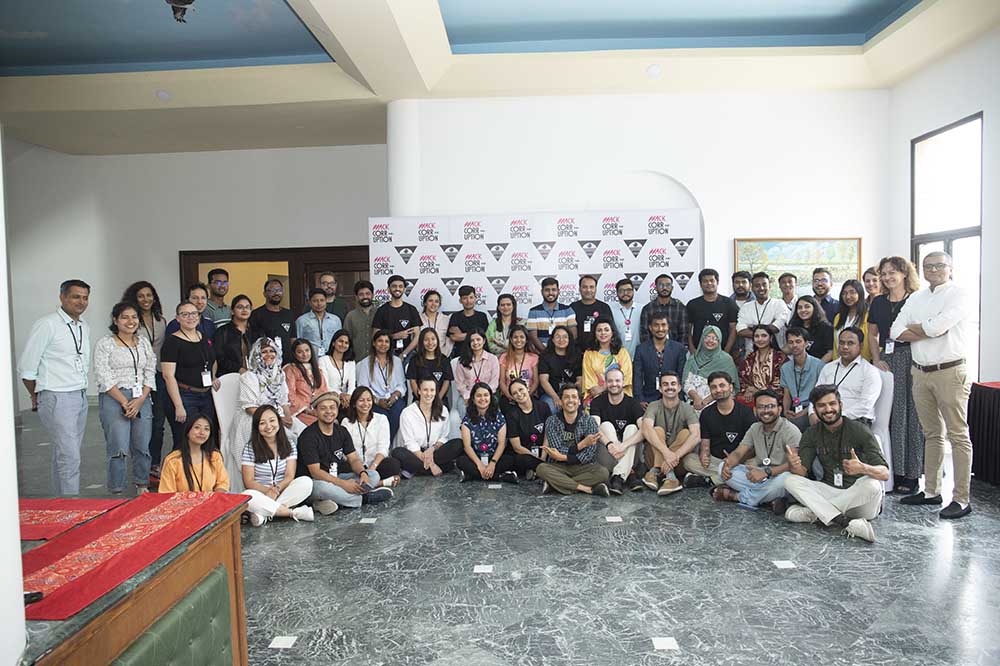
KATHMANDU: Accountability Lab has announced five teams selected for presenting the most feasible ideas in the second ‘HackCorruption’ event held in Kathmandu from April 27 to 30.
A total of 11 teams comprising 49 innovators from Nepal, India, Bangladesh and Pakistan participated in the hackathon held to identify and support talented individuals from the civic tech, central statistics Office (CSO), and activist arenas, to build innovative solutions to combat corruption. The teams were allowed to choose one of the three themes — Budget and Ownership Transparency, Open Contracting and Transparency of Public Procurement, and Digital Citizenship to Constrain Corruption — and work on it to create ideas, find solutions and develop tools to fight corruption.
[gallery link="file" columns="2" size="full" ids="35841,35853,35850,35848,35847,35844,35845,35843"]
The five selected teams include e-PMS (Tauhidul Islam, Habibullah Mohammad Himel, Rija Shrestha, Sajib Kumar Roy, K.M. Rafiqul Alam, Rifat Rahman); DAAC (Himanshu Panday); Support My School (Richa Neupane, Himal Tamang, Manisha Deshar, Samidha Rimal, Sarila Ngakhusi); PAK Zameen (Mohammad Taha, Daniyal Ahmed Khan, Ifaza Waheed, Muhammad Muneeb Riaz, Shahzadi Faiza); and KYP: Know Your Parliamentarian (Sidra Shafi, Surendra Koirala, Kaneez Ayesha Abbasi, Sujan Regmi, Paresh Rawal).
The purpose of e-PMS (e-Procurement Monitoring System) is to establish a monitoring tool for the e-procurement system (E-GP portal) in Nepal and Bangladesh, enabling third parties or civil society to monitor procurement. The system will flag potential corruption using a series of indicators, such as the frequency of awards to single contractors, reduced time between bidding deadlines and award dates, and dummy bidding, among others.
DAAC is grounded in digital anthropology and using Natural Language Processing and Digital Humanities, DAAC seeks to reimagine corruption data analysis. It will provide a natural language understanding of how corruption is taking place, through citizen reviews, stories, and media articles that are already available online but not aggregated, and will help policymakers, CSOs, and researchers understand where and how corruption can be curbed.
Support My School held schools accountable for infrastructure projects by enabling community members to measure and track the progress of development projects for which public funding is received. As a budget utilisation tracking mechanism, Support My School will also gather data and highlight where schools need funding beyond their allotted budget.
PAK Zameen aims to digitise land records in Pakistan and will combat corruption by eradicating the manipulation, duplication, and mutability of land records. Using blockchain to decentralise records and decrease corruption, PAK Zameen will simply land purchases and boost tax revenue by expanding the registered property tax base.
KYP: Know Your Parliamentarian aims to aggregate all the data available in the public domain (official government data, from authenticated data reports) and create a profile of individual parliamentarians. In addition to basic demographic, work, and party affiliation information, KYP will also aggregate information on assets and changes in their wealth, past and pending civil and criminal investigations, and their family tree to reveal political and business interests.
The selected teams will receive additional financial support of up to $10,000 each, mentorship, and ongoing training to help them build out their ideas, according to the organiser. They will also be engaged in a three-day intensive in-person boot camp in Kathmandu in coming June, according to Narayan Adhikari, South Asia Lead and Co-founder of Accountability Lab.
[gallery columns="2" size="full" link="file" ids="35931,35929"]
The Accountability Lab is implementing an in-person anti-corruption hackathon under the #HackCorruption initiative in partnership with the Center for International Private Enterprise (CIPE) and Development Gateway. Business 360 was the media partner for the event. This initiative is funded by the Bureau of International Narcotics and Law Enforcement Affairs (INL) under its Anti-corruption Solutions through Emerging Technologies (ASET) programme.
The judging panel comprised Agustina De Luca, Manager, Open Ownership Community Engagement; Umar Riaz, Civil Servant, Government of Pakistan; Muhammad Tanweer, Founder and CEO of App Desk, Pakistan; Hannah Hudson, Programme Implementation Manager, Integity Action; Bibhusan Bista, CEO and Co-founder, YoungInnovation, Nepal; Anna Kompanek, Director Global Programs, Center for International Private Enterprise (CIPE); and Eva Sander, Country Director, Accountability Lab Mexico.
Accountability Lab is a global translocal network that makes governance work for people by supporting active citizens, responsible leaders and accountable institutions.
READ ALSO:
Published Date: May 13, 2023, 12:00 am
Post Comment
E-Magazine

